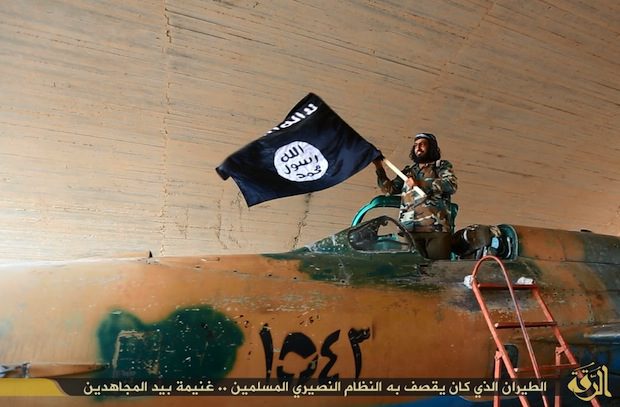Permanent Mideast Intervention Won’t Stop Terror

Last month, several Baghdad bombings attributed to ISIS killed more than a hundred civilians and wounded hundreds more. The attacks are a tragic reminder that Iraq is still a nation in turmoil. But they should also be a reason—more than 13 years after the decision to topple Saddam Hussein and undertake nation-building in Mesopotamia—to reevaluate U.S. policy in Iraq.
The occupation of Iraq has cost more than $2 trillion. The cost to deploy a single soldier there is estimated at roughly $775,000 per year; with nearly 5,000 U.S. troops in Iraq, that’s almost $4 billion per year. And the cost of airstrikes is about $8 million a day—or about $3 billion per year. Are these costs worth continuing to bear?
ISIS is largely a threat in Iraq and the region immediately surrounding it. The group’s overarching strategic goal is to establish an Islamic caliphate in the heart of the Muslim world by waging a war within the Middle East. It comes as no surprise, therefore, that the vast majority of victims of ISIS attacks have been Muslims.
Yes, there have been brutal and savage public executions of Americans by ISIS. But the hard truth is that these are not threats to U.S. national security, the homeland, or the American way of life. To recognize this fact is not to condone these actions, but we have to understand that such behavior is a provocation intended to draw the U.S. into a larger ground war, which would confirm the ISIS narrative that the West is engaged in a modern-day crusade to kill Muslims. We cannot afford to take the bait.
And since ISIS is not primarily a threat to the United States, the burden of combating it should not fall primarily on the United States, either. Rather, the nations in the region—primarily Turkey and the Gulf states—should deal with the problem, since they are most threatened and have the most to lose. But that means the U.S. cannot engineer the solution and will have to live with less than perfect—possibly giving up on regime change in Syria, for example, knowing that however unsavory the Assad regime might be, it does not represent a direct threat to U.S. national security. Letting Assad rule would allow Syria to confront ISIS. The same is true for the mullahs in Iran.
But aren’t the Paris terrorist attacks last November and the Brussels bombings in March proof that ISIS is waging war against the West? (ISIS claimed responsibility for both.) Certainly that’s the popular political narrative. Indeed, French president Francois Hollande declared the Paris attacks an “act of war.” Hollande also claimed that the attacks were “against France, against the values that we defend everywhere in the world.” But destroying the democratic values of the West has not been an ISIS goal. The reality is that targeting both France and Belgium had more to do with the foreign policy of those particular nations.
An ISIS statement after the Paris attacks made clear that they were acts of revenge for France’s involvement in the U.S.-led coalition bombing of militants in Iraq and Syria. And it said Belgium was targeted as “a country participating in the international coalition against the Islamic State.” In other words, they were attacks in response to Western military intervention in Muslim countries.
So instead of focusing security efforts on military intervention abroad, the U.S. would be better off investing in improved intelligence capabilities (particularly human intelligence rather than widespread technological eavesdropping). Then we might learn who poses a threat from abroad.
Yet we ignore rather than heed ISIS, just as we did al-Qaeda before them. Why did bin Laden make the U.S. a target for terrorism? He couldn’t have been more clear: It was in response to the United States “occupying the lands of Islam” with 5,000 U.S. troops in Saudi Arabia—the holy land of Mecca and Medina—after the first Gulf War. Just as those 5,000 troops in Saudi Arabia were an unnecessary U.S. military intervention, so are the nearly 5,000 U.S. troops now in Iraq. They will not make a material difference in the security situation in Iraq. But they will provide ISIS with a credible claim that the U.S. is waging a war against Islam, making it easier for the group to recruit and radicalize more Muslims to its cause and put America squarely in its crosshairs.
And airstrikes have proven to be largely ineffective at great cost. As of the end of last year, the U.S. and its allies had conducted more than 8,500 airstrikes (the majority by the U.S.) against ISIS in Iraq and Syria. According to the U.S., some 10,000 militants had been killed by airstrikes, or about 1.1 ISIS fighters per bomb dropped—at a cost of about $2.5 million per airstrike.
More soldiers and more bombs are not the solution to ISIS. This is an ideological battle that can be fought and won only by Muslims—and will not be resolved anytime soon. As such, the United States would do well to not insert itself into the middle of a civil war, which only makes us a target. We would be better off by adopting a position of restraint and acting as an offshore balancer-of-last-resort—intervening only if and when the situation can no longer be contained by the nations in the region.
Charles V. Peña is a senior fellow with the Defense Priorities Foundation. He has more than 25 years of experience as a policy and program analyst and senior manager, supporting both the Department of Defense and Department of Homeland Security. Peña is the former Director of Defense Policy Studies at the Cato Institute and author of Winning the Un-War: A New Strategy for the War on Terrorism.
Comments